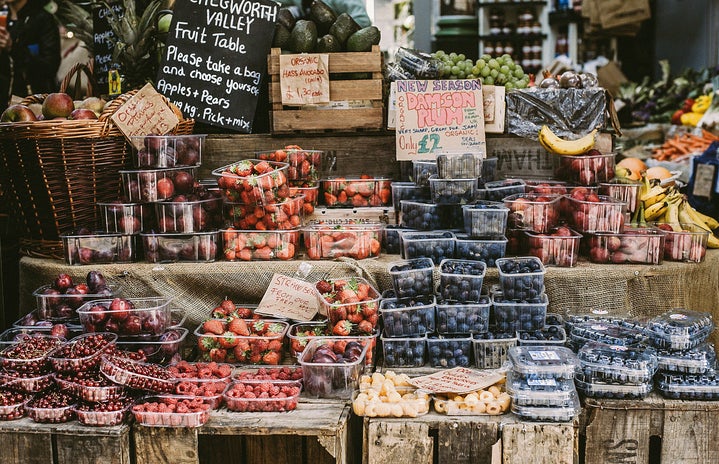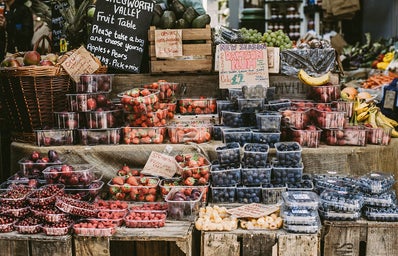As I drove through the expansive states of Colorado, Nebraska, and Iowa a few weeks ago, I was absolutely blown away by the vast size of the farms I-80 cut through. These midwest farms were so different from the typical New England farm in the sense that almost all of them appeared to be monoculture (the growing of one crop in a given area). Who knew that people could need so much corn! This realization and visualization of the mass industry farming has become in the United States has only emphasized my interest and value of buying locally and not feeding into industrialized agriculture.
Shopping locally is so important when it comes to food for so many reasons. Although to preface this article, I am not to say I am perfect when buying food. I try to buy mostly local food, but as a college student, pricing can be expensive and also sometimes all I want to eat is a box of Cheez-It Duoz. When I can I like to support local farms and businesses because this is both helping the local economy, community and the environment. Shopping locally helps these small farms and local businesses that have had an especially hard time during the pandemic. There are so many consumer benefits of buying local food including better taste, knowing where and how your food was grown or raised, and protecting yourself from harmful pesticides, herbicides, GMOs, hormones and antibiotics that might be in your food.
Industrial agriculture is relatively new in the last century, which is the large-scale growing of crops and animals. This is what I saw as I drove cross country, lots and lots of large scale farms that were likely using pesticides and herbicides and genetically modifying their crops to resist the chemicals. Not only are plants being grown in mass quantities, but so are livestock. Industrial farming has led to the use of antibiotics in livestock including cows, chickens, and pigs. These antibiotics are used to compensate for the inhumane conditions the animals are being raised in. Hormones are also used to enhance growth and development of livestock unnaturally. This new normal of farming practices has a whole array of negative effects on the consumer as well as the environment. These farming practices over time deplete the nutrients from the land and fragment natural wildlife habitats, as well as pollute air and water with toxic chemical by-products.
Genetically modified organisms (GMOs) are a huge contributor to the rise in industrial farming. This term is used when scientists in laboratories choose specific genes from the desired traits of agricultural products, they then copy this genetic code and integrate it into the plants to make a “super plant.” These genes are often not even from the same plant but are chosen from any other plant, animal, bacterium or fungus. Farmers have used GMOs to create larger, juicier, more weather tolerant or herbicide/pesticide tolerant species. If a plant is more resistant to pesticides and herbicides then they can spray large quantities on fields and eliminate any species but the crop itself, increasing profitability of farms along with environmental degradation and increased pollution. These chemicals used not only are bad for the environment as they pollute the air and leach into water sources, but some have also been found to be carcinogenic and lead to related health effects in humans. Animals and wildlife are also directly affected by the toxins as many are a target for being eliminated such as bugs and pests, but there is also potential for bioaccumulation in larger species.
But what about organic foods? Organic foods are better! I definitely lean towards organic foods when at the supermarket, as they are the best bet when it comes to sustainable food practices on a large scale. The term “organic” refers to foods that meet the United States Department of Agriculture (USDA) guidelines. This entails that the farmers do not use synthetic fertilizers or pesticides and do not use GMOs. They also must provide humane living conditions allowing their livestock to graze on a pasture without the use of antibiotics or hormones. They also must mitigate the use of preservatives or other artificial ingredients. It is important to understand, just because something is “organic” doesn’t necessarily make it more healthy for you, although it IS better for the agricultural system.
It is also important to understand that agriculture makes up approximately 10% of the total U.S. greenhouse gas emissions, producing 658.6 million metric tons of CO2 in 2018. Most of these emissions come from cows, soils and rice production. A good way to mitigate your carbon footprint is to shop locally, where the journey of your sirloin steak is less extensive! Shopping locally is so important as to not feed into the agriculture industry that is not producing crops and livestock sustainably.
Here are some places you can shop locally in the Orono area where you can grow your local community, boost local economy, be more environmentally sustainable, and enjoy some really delicious wholesome food. Check out the local farmers markets in Bangor and Orono, they have a variety of local farmers with fresh fruits, veggies, herbs, meats, flowers, and a variety of canned goods and baked treats. You could also go to the source! Go find a local farm or farmstand that sells their goods, there are tons of local farms around – just drive 10-20 min out of Orono and you’re bound to find one! You can also grow your own food, make a raised bed garden and eat fresh produce all summer into the fall! For a more convenient alternative, there are health food stores in the Bangor area that provide a lot of local goods. My two favorites are the ‘Natural Living Center’ and ‘Tiller and Rye.’ If you like to shop at supermarkets, try to shop organic as they support better agricultural practices! I hope you have a little more incentive to shop local in the future to support your economy, small businesses and most importantly help support and conserve your environment and planet!
Orono Farmers Market: Tuesdays 2:00-5:30pm, and Saturdays 8:00am-12:00pm
Bangor Farmers Market: Sundays 11:00am-1:30pm


